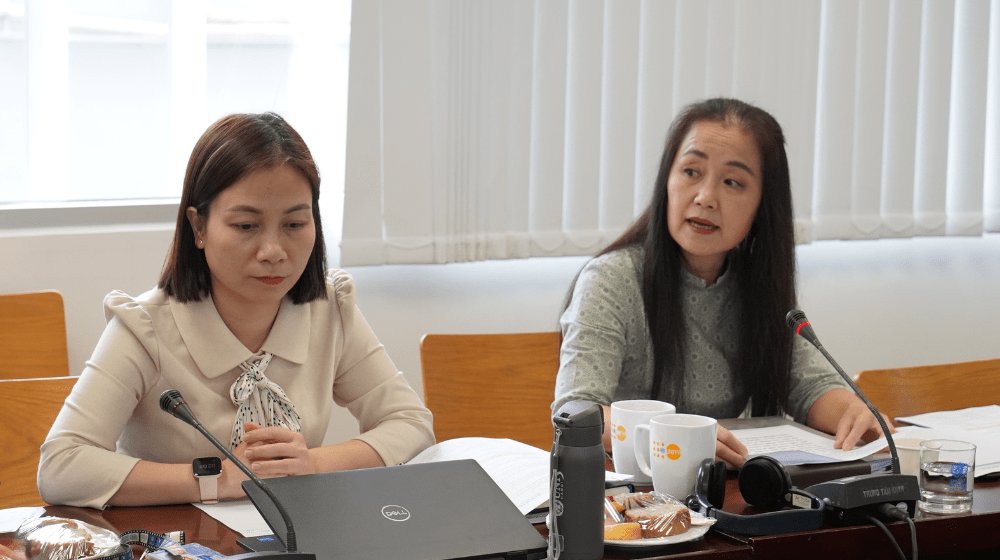On behalf of the United Nations Population Fund (UNFPA) in Viet Nam, I am very pleased to welcome you all to the validation workshop on the Endline Study on Gender-Biased Sex Selection (GBSS).
I would like to thank the DEPOCEN for conducting this end-line study, MOLISA and VFU for supporting the field work, and the local partners from Ba Ria - Vung Tau, Bac Giang, Hoa Binh and Binh Phuoc provinces for their assistance and participation in the field work. And I would like to express my special appreciation to the respondents from these four provinces for sharing their experiences and stories to the study.
Dear participants,
UNFPA has made a substantial contribution to the advancement of gender equality in Vietnam over the last few decades. However, GBSS remains to be a stubborn harmful practice against women and girls in the country. Together with the benign tradition “son preference”, it is a result of gender-biased systems that give boys and men a greater social position and prioritize male over female children.
The "sex ratio at birth (SRB)" is a direct proxy indicator of the manifestation of GBSS, and the skewed SRB in Viet Nam. More boys than girls have been born, and the current sex ratio at birth is 111.5 boys per 100 girls in 2019, against the biologically “normal” SRB of 105-106 boys per 100 girls. Data from the 2019 Census also estimated that every year, 45,900 female births are missing in Viet Nam. The excess of male adults aged 15-49 years will rise to 1,500,000 men by 2034 and may reach 2,500,000 if SRB fails to finally decrease.
Dear participants,
The project “Addressing Gender Biased Sex Selection and related harmful practices in Asia” aimed at building on and strengthening evidence-based national policies and programmes to address son preference, the undervaluing of girls and gender inequalities resulting in GBSS in Asian countries. This is to make a good contribution to the achievement of Sustainable Development Goal 5 on gender equality and the empowerment of women, particularly in relation to Target 5.3 on eliminating harmful practices. The project was implemented from January 2020 to December 2022 in 03 focus countries, including Bangladesh, Nepal and Viet Nam.
In Vietnam, under the strong collaboration between UNFPA and MOLISA, MoH, VFU, and CSAGA, the programme was delivered in Bac Giang and Ba Ria - Vung Tau. In order to independently assess the relevance, effectiveness, efficiency, sustainability and early impact of GBSS programme, especially to evaluate the level of change in the knowledge, attitude, practice (KAP) of people, this endline study was conducted in two project provinces, and other two control provinces, namely Hoa Binh and Binh Phuoc. In addition, the endline study is designed to provide evidence-based recommendations for an improved programme design to reduce GBSS and Son Preference.
The specific objectives of the study were to:
- Explore knowledge and understanding of local authorities, mass organizations, media, service providers, community leaders and religious leaders on policies and practices on GBSS;
- Measure the level of KAP of community women and men, married and unmarried, and their family’s members on GBSS;
- Draw key lessons and recommendations for scaling-up at provincial and nationwide application; and
- Provide a set of clear, strategic, actionable and forward-looking recommendations for the next programming cycle.
The results from the end-line study reveal the improvement in people’s perceptions toward gender equality, for example, more men are willing to do housework, particularly taking care of children and the elderly. Especially, the percentage of people with the opinion that "every family must have at least one son to continue the family line” has decreased, comparing to the baseline. In addition, people have better awareness of the consequences of excess sons and knowledge related to policies and laws. However, the study also shows that gender norms and son preference still exist, hence, we should continue working on addressing gender inequality.
Dear Participants,
Among 17 SDGs under the 2030 Agenda, the SDG 5 "Achieve gender equality and empower all women and girls" is particularly important in all circumstances, including in crisis and humanitarian situations. And it is falling behind in Viet Nam and in many other countries. The 2030 Agenda has pledged to leave no one behind. This means that in our development efforts, girls should be one of the priorities. The world, including Viet Nam, should ensure that all the opportunities are equally granted to girls. The culture of 'son preference’ has to be changed, where an equal valuing of girls is something that we must instil in all the contexts.
With this, I wish you a productive workshop to ensure that the report fully reflects the project’s impact. This will provide valuable evidence and key lesson-learned for the next programming cycle.
Thank you very much for your participation and contributions to the workshop!


